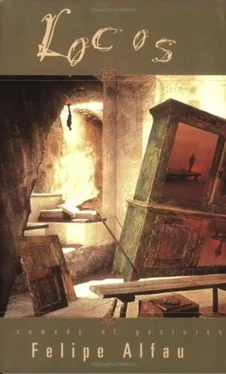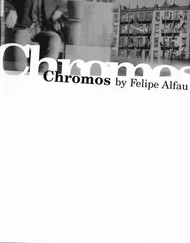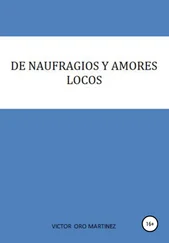At this moment two nuns entered the café and went from table to table seeking alms for their convent. I pointed at one of them:
“Look at that nun. The one that is interfering now between El Cogote and the woman. She is quite attractive to be a nun. She would have made a good woman of the world. Do you notice how gaily she smiles and how white her teeth are? That is Sister Carmela.”
The two nuns had now approached a distant table where two priests sat, and were talking to them.
“Look at that priest, the one with the best manners who is standing talking to Sister Carmela. That is Padre Inocencio. He is supposed to do a great deal of good around here.”
The two nuns went out followed by Padre Inocencio, who opened the door for them and remained there a while watching them walk across the plaza.
“Behold the bartender. See his splendid apostolic beard and the boisterous way in which he is laughing with El Cogote. He is Don Laureano Baez, an old rogue and very amusing. The old woman behind him with the sad expression who is wiping the glasses is his wife, Doña Felisa.
“Now notice that man sitting at that table. The one with the white wig and the poetic expression, who seems so distracted and aloof His name is Garcia.”
The man was smelling a flower pinned to his lapel.
At that moment a little dog, who was nosing about the café, began to paw the man’s leg. Garcia gave the dog a vicious kick, then he tossed a coin over to the bartender and departed.
“Look at that pale lady dressed in black sitting at that table with a gentleman. Notice how she is going to sleep. She is Doña Micaela Valverde.”
Her escort got up silently, took his hat and left the café on tiptoes. Doña Micaela, who was now fast asleep, did not see him go.
For some time I had been noticing a man standing by a table where four men sat. He was showing them small objects which he took out of his pocket and which apparently he was trying to sell them. He turned around and then I recognized him. We greeted each other and he walked toward our table holding a small object in his hand
I said to Fulano:
“This is Don Gil, an old dealer in junk, who peddles his stuff around the cafés.”
Don Gil approached us. He leaned with a hand on the wall and in the other he showed us a little Chinese figure made of porcelain.
“Here is a real bargain,” he said, tossing the porcelain figure on the palm of his hand. “It is a real old work of art made in China. What do you say?”
I looked at the figure which was delicately made. It represented a herculean warrior with drooping mustache and a ferocious expression. He had a butterfly on his shoulder. The color of the face was not yellow but a darker color, more like bronze, and as the attire was not very representative, I suggested:
“Perhaps it is not Chinese but Indian.”
Don Gil, who undoubtedly liked China better than India, looked slightly annoyed.
“No, it is Chinese,” he said.
Then I could not help noticing that the hand that held the figure was quite dirty and inferred that its sister probably was in the same condition.
I said:
“Don Gil, be careful. Don Laureano is going to scold you for dirtying his walls.”
Don Gil withdrew his hand, leaving a dirty mark that seemed unusually small upon the whitewashed wall, and continued to praise his merchandise:
“Yes, this is a real Chinese mandarin or warrior, I don’t know which, and it is a real bargain. Perhaps your friend might be interested. ”
Fulano gave a jump and let out a yell. It was the first time that a stranger had noticed him of his own accord.
Poor Don Gil was so frightened that he dropped the porcelain figure, smashing it in a thousand pieces on the marble top of the table. I fancied I saw a furious look in the little porcelain head now detached from the body.
Don Gil wiped the pieces to the floor and went away, trampling over them with a chagrined expression.
“Well,” I said when Don Gil had gone, “I suppose you have had enough characters for a day. It is quite dark now and you had better get ready for your suicide.”
Fulano scribbled a note saying: I have committed suicide by jumping into the Tajo , and said:
“All my hopes depend on this.” He got up and departed, promising to see me in Madrid.
Now I, as the author of this tale, can see all that Fulano did after he went away, although I am supposed to remain seated at the café table.
Fulano went to his room. He gathered all his documents and credentials and started on his fateful journey. As he walked down the stairs to the street, night had fallen, and each step he took was like dropping a century into the past, until he emerged in the midst of a hostile city which died in the Renaissance and yet lived the strangest, posthumous life. Toledo was in silence, but Toledo did not rest. As Fulano advanced hesitantly, he felt the restless and decrepit lines of buildings suddenly agitated by a wind of the past, the pavement seemed to rise, fall and revolt in its stony unevenness, like a stormy sea; he walked through streets so steep that he had to lean against the wall to keep from falling and he rushed through alleys that ran down from the top of the city like jumping torrents, to precipitate themselves down into the waters of the Tajo.
Toledo comes to life every night. It is a city of silence, but not a city of peace; at night it multiplies its interests, it becomes a city of horror, of fearful dreams of the past, of dreadful historical nightmares. At the turn of a street, this impression hit Fulano with such force that it nailed him to the spot, as if turned into one more stony specter. All the shadows of things gone came to meet him from out dark alleys, from out sad corners, to condense and take shape, to make the night blacker. He could imagine the figure of Don Pedro el Cruel, his knees rattling, trailing along the familiar alley to the house of the Jew who lent him money. He could sense the heavy atmosphere charged with the deadly breath of the Inquisition.
This silence, this feeling of being left alone to share a city with the dead, suddenly revealed an idea to Fulano. Toledo, as he hoped to be soon, was a myth, Toledo did not exist. It rose at night upon its historical and aesthetic signification, forsaken among this loneliness of sterile Castilla. And thus thinking, Fulano stumbled on like a frightened, forsaken shadow after its own body. The narrow, crooked, tortuous streets fled from him, denying his path, mocking, snarling, like snakes in a jungle of bizarre structures; he staggered from one surprise into another, carried by this immense and irresistibly suggestive strength. He passed houses that were horribly worn out where they joined the ground, their stones lent together, and doors that were never opened and through whose ragged bottoms medieval cats sneaked in and out. He heard the waters of the Tajo calling and all this past splendor fading away in eternal response, all this past glory slipping down the hill, sinking into the Tajo below.
Fulano knew he had been swallowed by this maelstrom of the past, that he had sunk back centuries in history, and had already lost his identity of present existence. He was choking from this overwhelming feeling of condensed time, he was hopelessly lost in this darkness of thousands of superimposed past nights, in this labyrinth of streets that tossed him to and fro, threatening to drag him in their ominous stream and thrust him down into the Tajo, into oblivion.
His sense of direction utterly lost, Fulano let himself be ejected, cast out centrifugally, gravitationally by this semiconical city, now spinning in his dizzy mind, and he crossed one by one all the walls of Toledo, each one framing a period of history, like conquering phalanxes seen in perspective, each wall larger and lower, descending the hill, like steps, falling down into the Tajo.
Читать дальше












